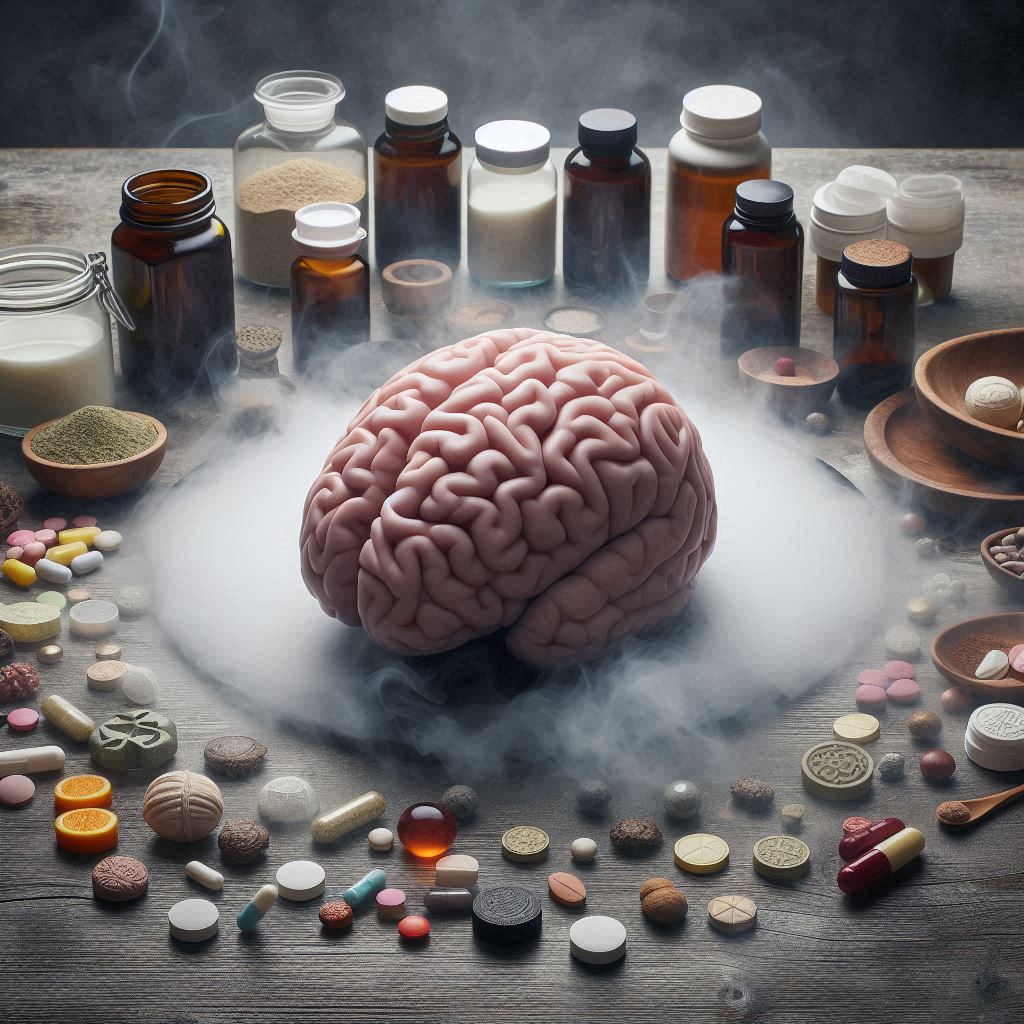Supplements, Home Remedies, and Diet to Normalise Brain Fog
Supplements for Brain Fog
The use of dietary supplements has gained popularity as a means to enhance cognitive function and alleviate symptoms of brain fog. Several key supplements have been identified as beneficial:
- Omega-3 Fatty Acids: Found in fish oil, omega-3 fatty acids are essential for brain health. They have been shown to improve cognitive function and reduce inflammation in the brain.
- Vitamin D: This vitamin plays a crucial role in brain health. Deficiency in vitamin D has been linked to cognitive decline and mood disorders.
- Magnesium: Known for its calming properties, magnesium can help reduce anxiety and improve sleep quality, both of which are essential for cognitive clarity.
- B-Complex Vitamins: These vitamins, particularly B6, B9 (folate), and B12, are vital for energy production and neurotransmitter synthesis, which are crucial for optimal brain function.
- L-Theanine: An amino acid found in green tea, L-theanine promotes relaxation without drowsiness, potentially enhancing focus and attention.
- Rhodiola Rosea: This adaptogenic herb is known for its ability to combat fatigue and improve mental performance under stress.
Incorporating these supplements into one’s daily routine may provide the necessary support for cognitive function, particularly in individuals experiencing brain fog.
Home Remedies for Brain Fog
In addition to supplements, various home remedies can be employed to alleviate brain fog. These remedies often focus on lifestyle changes and natural practices that promote mental clarity:
- Adequate Sleep: Prioritising sleep hygiene is essential. Establishing a regular sleep schedule and creating a restful environment can significantly improve cognitive function.
- Physical Activity: Engaging in regular exercise enhances blood flow to the brain and promotes the release of endorphins, which can improve mood and cognitive clarity.
- Mindfulness Practices: Techniques such as meditation, deep breathing, and yoga can help reduce stress and improve focus.
- Hydration: Maintaining proper hydration is crucial for cognitive function. Dehydration can lead to fatigue and impaired concentration.
- Limiting Screen Time: Reducing time spent on electronic devices can help minimise distractions and mental fatigue.
These home remedies can be easily integrated into daily life and may provide significant benefits in managing brain fog.
Diet to Normalise Brain Fog
Diet plays a pivotal role in cognitive health. A balanced and nutritious diet can help mitigate the symptoms of brain fog. Key dietary considerations include:
- Incorporating Brain Foods: Foods rich in antioxidants, healthy fats, and vitamins are particularly beneficial. Examples include:
- Fatty Fish: Salmon and mackerel are excellent sources of omega-3 fatty acids.
- Leafy Greens: Spinach and kale are high in vitamins and minerals that support brain health.
- Berries: Blueberries are known for their antioxidant properties, which can protect the brain from oxidative stress.
- Nuts and Seeds: These are rich in healthy fats and vitamin E, which are essential for cognitive function.
- Avoiding Processed Foods: A diet high in processed foods and sugars can lead to inflammation and cognitive decline. Opting for whole, unprocessed foods is advisable.
- Staying Hydrated: Consuming adequate water and hydrating foods, such as fruits and vegetables, is essential for maintaining cognitive function.
In conclusion, normalising brain fog requires a comprehensive approach that includes the use of supplements, home remedies, and dietary adjustments. By focusing on these areas, individuals can enhance their cognitive function and overall well-being. It is advisable to consult a healthcare professional before making significant changes to one’s diet or supplement regimen, especially for individuals with underlying health conditions.
There you have it… See what works for you…
Campbell M Gold
To Create Health, Wealth, Success, and Longevity through the Power of Your Subconscious Mind, Visit: Campbell M Gold.com
Visit The Store and see what else can be of help





